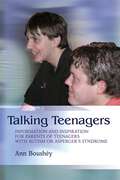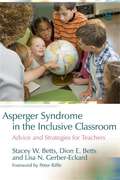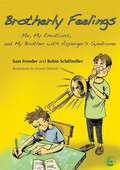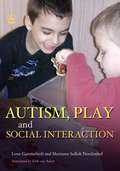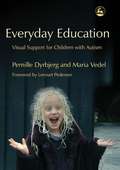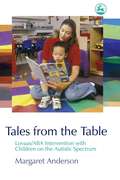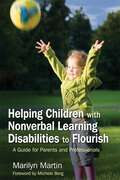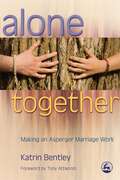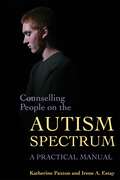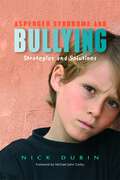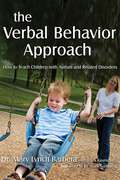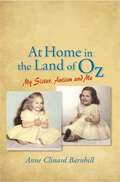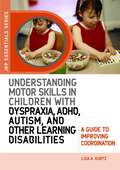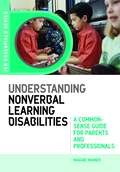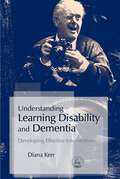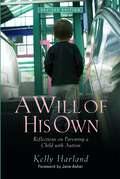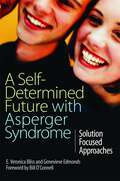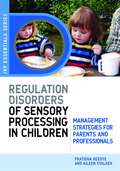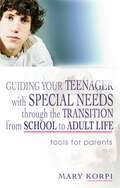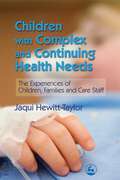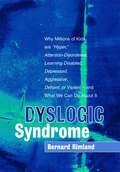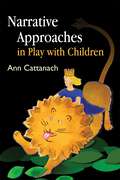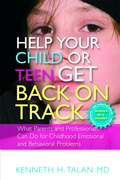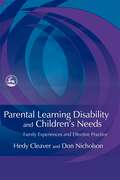- Table View
- List View
Talking Teenagers: Information and Inspiration for Parents of Teenagers with Autism or Asperger's Syndrome
by Ann BoushéyAnn Boushéy's teenage son Jon was diagnosed with high-functioning autism in kindergarten. Having mastered the day-to-day challenges that parenting a young child with autism or Asperger's Syndrome pose, Talking Teenagers considers questions surrounding parenting across the spectrum during the teenage years. Written out of her own experience, this inspirational book provides the information that will encourage other parents with teens on the autism spectrum. Covering everyday topics, from what to take on vacation and dealing with anger, to sex education and planning for the parents' own demise, Ann ends each chapter with thoughtful vignettes: 'Chicken Nuggets for the Soul'. After reading this book, parents will come away with a sense of empowerment and feeling that they are not alone, while professionals will gain a valuable and compassionate insight into the world of parenting a teenager on the autism spectrum.
Asperger Syndrome in the Inclusive Classroom: Advice and Strategies for Teachers
by Dion Betts Stacey W. Betts Lisa N. Gerber-EckardAsperger Syndrome in the Inclusive Classroom offers support and practical techniques for teachers who work with children with Asperger Syndrome (AS). Based on the successful experiences of classroom teachers, and written from a teacher's perspective, this book provides creative and easy-to-apply strategies that support and encourage AS students in the mainstream classroom, from organization and time management techniques to framing classroom instructions to make lessons more accessible for children with AS. The authors' straightforward, practical advice relates to every part of the school day and includes advice for teaching specific subject areas. They give tips on helping students navigate the school environment, how to handle social situations like lunch and breaks, and what to do during unstructured periods. This book is essential reading for teachers and school staff who want to fully include AS students in the classroom.
Brotherly Feelings: Me, My Emotions, and My Brother with Asperger's Syndrome
by Robin Schiffmiller Sam FrenderIt isn't easy being eight years old and having an older brother whom other children often misunderstand. They don't realize that when he doesn't laugh at their jokes it's because he doesn't understand them. They don't know that when he doesn't speak to them or look at them it's because he doesn't know what to say or how to make eye contact. They don't realize that he behaves this way because he has something called Asperger's Syndrome. Sam knows that his brother Eric is different from him because his brain works differently. So, when the other children bully Eric, it makes Sam feel protective of him. But sometimes, when Eric behaves oddly, Sam feels embarrassed too. Sometimes, when Eric gets lots of attention, it makes Sam feel resentful - then, when he considers that Eric needs a lot of help and attention, it makes Sam feel guilty for feeling resentful. There are so many different feelings Sam experiences! Brotherly Feelings explores the emotions that siblings of children with Asperger's Syndrome (AS) commonly experience. With illustrations throughout, this book will help siblings to understand that their emotional responses - whatever they are - are natural and OK. It is the ideal book for parents and professionals to use with siblings to discuss their emotional experiences, and will also help children with AS to form an understanding of the feelings of other family members.
Autism, Play and Social Interaction
by Marianne Sollok Nordenhof Lone GammeltoftAutism, Play and Social Interaction is a fully illustrated guide that explains how to help children with autism spectrum disorders engage in interactive play, which is vital for the acquisition of social skills and attention to shared activities. The authors explain how to set up suitably structured play environments, games schedules and play routines, and how to use visual aids and other props to facilitate co-operative play and interaction. Common children's games have been adapted to accommodate children with autism spectrum disorders and range from simple interaction, such as `putting-in' and `give and take', to more complex games like `hide and seek', `sound-lotto' and `spin the bottle', as well as games that teach social behaviour, such as exchanging toys and engaging with other children for play opportunities. This is a practical and accessible book for parents and teachers of children with autism spectrum disorders, as well as professionals working with these children.
Everyday Education: Visual Support for Children with Autism
by Maria Vedel Pernille DyrbjergVisual support aids can be highly effective tools for increasing levels of communication and independence in children with autism, who often have difficulty interpreting spoken language and non-verbal facial expressions. Fully illustrated with inspiring examples, Everyday Education provides a wealth of ideas for creating visual support aids for children on the autism spectrum. Photographs and clear, practical explanations describe how these tools can be arranged helpfully around the home for the child to use. The authors describe how visual support aids can be used in all kinds of everyday situations, from labelling - for example, sticking a picture of a dinner plate with a knife and fork to the chair in which the child sits at meal times - to putting together a pictorial activities schedule for the child to refer to. This fun and encouraging book will be a valuable source of ideas for parents of children with autism and professionals working with them.
Tales from the Table: Lovaas/ABA Intervention with Children on the Autistic Spectrum
by Margaret AndersonTales from the Table is a practitioner's account of the successes and limitations of using Lovaas/ABA home education with five young boys on the autistic spectrum. The abilities and skills of these children before, during and after intervention are documented with a focus on the realities of undertaking Lovaas/ABA home education: the impact of a 35-hour learning week on both child and parents, changing tutors and issues of commitment to the approach. Each chapter includes a commentary on the programme from a different perspective, with the voices of parents, siblings and teachers providing the context to the individual children's learning processes. This book will help parents to make an informed decision about using Lovaas/ABA interventions and will give professionals and students practical insights and useful information on the approach.
Helping Children with Nonverbal Learning Disabilities to Flourish: A Guide for Parents and Professionals
by Marilyn Martin Zion`Imagine getting lost in your own home, forgetting where the bathroom is at work, or being unable to operate a simple door knob. These are just some of the myriad challenges faced by individuals with a Nonverbal Learning Disability, or NLD...In Helping Children With Non-Verbal Learning Disabilities to Flourish, Marilyn Martin gives an overview of NLD and strategies for teaching individuals with this disability. Using examples of her struggles to help her daughter, who has NLD, as well as current research, she has written a book helpful for both parents and professionals. In addition to her experiences with her daughter, Martin is a Learning Specialist with more than fifteen years of experience working with students who have dyslexia, NLD, and other learning disorders... This book is a good introduction to NLD and interventions for treating it... As it gains recognition as a distinct learning disorder, interventions and informative books, like this one, will open doors, literally and figuratively, for families and individuals touched by NLD.' - Foreword, Autumn 2007 `Author Marilyn Martin's daughter Sara was diagnosed with Nonverbal Learning Disability (NLD). Marilyn offers a comprehensive developmental profile of children with NLD and explores the controversies surrounding the condition so parents and professionals can identify learners with NLD and ensure they receive early intervention. Offering practical advice on NLD at home and at school, the book describes step by step interventions for improving a range of skills from penmanship to social acumen.' -Autism Us, 2007 `Marilyn Martin's book Helping Children with Nonverbal Learning Disorder to Flourish is an exciting and essential new addition to the literature. ... Martin shines in her ability to match interventions to a broad range of problems and examples abound in every chapter. Clear, concise, and detailed explanations are given so that the interventions can be applied skillfully. ... Each intervention is presented in a terrifically useful and usable format that includes the problem, strengths available, proposed solution, how the solution can be generalized, the goal of the intervention, and a very up-to-date and helpful listing of relevant resources.' - from the Foreword by Michele Berg, Director, Center for Learning Disorders, Family Service and Guidance When you continuously cannot find the bathroom in your best friend's house, or you cannot print the letter `t' when all your friends are writing volumes, you notice, and you ask questions. So it was for Marilyn Martin's daughter, Sara, who was diagnosed with Nonverbal Learning Disability (NLD). This book skilfully combines a comprehensive guide to NLD with the inspiring story of how Sara transformed herself from that young girl whose existence seemed darkened by learning difficulties into the capable young woman she is today. In Helping Children with Nonverbal Learning Disabilities to Flourish, Marilyn Martin presents a comprehensive developmental profile of children with NLD. She explores the controversies surrounding the disorder so parents and professionals can identify learners with NLD and insure they receive early intervention. Offering practical advice on NLD at home and at school, she describes step-by-step interventions for improving a range of skills from penmanship to social acumen. This book is essential reading for parents and professionals working with children with NLD.
Alone Together: Making an Asperger Marriage Work
by Tony Attwood Katrin BentleyCommunication is one of the biggest challenges faced by people with Asperger's Syndrome (AS), yet an Asperger marriage requires communication more than any other relationship. Thousands of people live in Asperger marriages without knowing the answers to important questions such as `What behaviours indicate that my spouse has AS?' `Is it worthwhile to get a diagnosis?' `Is there hope for improvement?' Katrin Bentley has been married for 18 years. Since receiving her husband's diagnosis of AS, their marriage has improved substantially. They learnt to accept each other's different approaches to life and found ways to overcome problems and misunderstandings. Today they are happily married and able to communicate effectively. Alone Together shares the struggle of one couple to rescue their marriage. It is uplifting and humorous, and includes plenty of tips to making an Asperger marriage succeed. This book offers couples hope, encouragement and strategies for their own marriages.
Counselling People on the Autism Spectrum: A Practical Manual
by Katherine Paxton Irene EstayThe characteristics of autism spectrum disorders (ASD) present unique challenges, not only to people themselves affected, but also to counselling professionals. This manual provides counselling techniques that work not only for professionals, but also for individuals either coping with being on the spectrum themselves, or living with someone who has an ASD. Regardless of intellectual and linguistic ability, people on the autism spectrum often have significant impairments in emotional expression, regulation, and recognition, and they are known to have higher rates of depression and anxiety than the general population. This comprehensive book shows how to develop the tools necessary to help people on the spectrum cope with their emotions, anxieties, and confusion about the often overwhelming world that surrounds them. Illustrated with useful case studies, it covers a range situations where counselling may be helpful for individuals with ASD, both children and adults, families where a member is on the spectrum, and couples where a partner has ASD. It also addresses specific issues, including depression, anxiety, emotional regulation, social skills, and stress, with effective strategies for dealing with each issue. As well as being indispensable for counsellors, this book provides valuable information and advice for anyone working with people and families affected by ASDs.
Asperger Syndrome and Bullying: Strategies and Solutions
by Nick DubinBullying is a serious problem for people with Asperger Syndrome (AS), both at school and in the workplace, and displaying 'different' behavior, such as not understanding social rules or hand-flapping, exacerbates the risk of being victimized. Writing in an accessible, informal style, the author describes the bullying behavior he and other individuals have experienced, and the effect this has had on their lives. He outlines the reasons for bullying behavior and the danger of persistent recurrence if it remains unchecked, as well as the critical importance of 'involving the bystander'. Nick Dubin goes on to provide a range of effective strategies to address bullies and bullying that can be applied by parents, professionals, schools, and individuals being bullied. He stresses the importance of peer intervention, empathetic teachers, and verbal self-defense, and shows how lack of support, condemning of 'tale telling,' or even blaming the victim reinforces bullying. This book offers individuals with AS who are being bullied the opportunity to see that they are not alone, and it is an invaluable source of advice for parents, teachers, professionals and personnel managers.
Autistic Planet
by Marc Thomas Jennifer ElderAutistic Planet is a magical world where all trains run exactly to time, where people working in offices have rocking chairs, and where all kids dream of winning the chess World Cup. Join us on a journey to this alternative reality, where being different is ordinary, and being "typical" is unheard of! Full of colour illustrations and written in child-friendly rhyme, this book is ideal for children aged 6 and over. Jennifer Elder is assistant editor in a book publishing company. She and her husband have two sons, one of whom has ASD. You can read more about their family in the memoirs Sixpence House and Not Even Wrong. Jennifer is the author of Different Like Me: My Book of Autism Heroes, also published by Jessica Kingsley Publishers.
The Verbal Behavior Approach: How to Teach Children with Autism and Related Disorders
by Mary Lynch Barbera Tracy RasmussenThe Verbal Behavior (VB) approach is a form of Applied Behavior Analysis (ABA), that is based on B.F. Skinner's analysis of verbal behavior and works particularly well with children with minimal or no speech abilities. In this book Dr. Mary Lynch Barbera draws on her own experiences as a Board Certified Behavior Analyst and also as a parent of a child with autism to explain VB and how to use it. This step-by-step guide provides an abundance of information about how to help children develop better language and speaking skills, and also explains how to teach non-vocal children to use sign language. An entire chapter focuses on ways to reduce problem behavior, and there is also useful information on teaching toileting and other important self-help skills, that would benefit any child. This book will enable parents and professionals unfamiliar with the principles of ABA and VB to get started immediately using the Verbal Behavior approach to teach children with autism and related disorders.
At Home in the Land of Oz: Autism, My Sister, and Me Second Edition
by Anne BarnhillAnne's sister Becky was born in 1958, long before most people had even heard of autism. Diagnosed with 'emotional disturbance,' Becky was subjected for much of her childhood to well-meaning but futile efforts at 'rehabilitation' or 'cure,' as well as prolonged spells in institutions away from her family. Painting a vivid picture of growing up in small-town America during the Sixties, Anne describes her sister's and her own painful childhood experiences with compassion and honesty. Struggling with the separation from her sister and the emotional and financial hardships the family experienced as a result of Becky's condition, Anne nevertheless found that her sister had something that 'normal' people were unable to offer. Today she is accepting of her sister's autism and the impact, both painful and positive, it has had on both their lives. This bittersweet memoir will resonate with families affected by autism and other developmental disorders and will appeal to everyone interested in the condition.
Understanding Motor Skills in Children with Dyspraxia, ADHD, Autism, and Other Learning Disabilities: A Guide to Improving Coordination
by Lisa A. Kurtz'The book is user-friendly and includes clear diagrams in each section, along with tables to outline key points. I found these very useful and they are an easy reference/ reminder, for example, they include a normal development chart, what assessments are available and their main aims.' - National Association of Paediatric Occupational Therapists Coordination problems often make everyday activities a challenge for children with learning disabilities. This accessible manual offers practical strategies and advice for helping children with coordination difficulties. The author explains how to recognize normal and abnormal motor development, when and how to seek help, and includes specific teaching strategies to help children with coordination difficulties succeed in the classroom, playground, and home. She describes a wide range of therapeutic methods and provides a comprehensive list of resources. Full of practical help, this is essential reading for anyone caring for, or working with, children with developmental motor concerns.
Understanding Nonverbal Learning Disabilities: A Common-Sense Guide for Parents and Professionals
by Maggie MamenThis easy-to-read guide offers a complete overview of Nonverbal Learning Disabilities (NLDs) and the wide variety of symptoms that different types of NLD present. Maggie Mamen enables readers to select the most relevant strategies for coping with and managing their particular symptoms. She provides a wealth of practical advice on key skills such as developing written and verbal communication, understanding social clues, managing behaviour, self-regulation and improving organization. She also covers relevant teaching methods for the classroom. This practical and accessible introduction is an essential guide for those families and professionals working with children and adults with NLDs.
Understanding Learning Disability and Dementia: Developing Effective Interventions
by Diana KerrUnderstanding Learning Disability and Dementia covers all the essential issues in supporting a person with a learning disability when they develop dementia. Like the population at large, people with learning disabilities are living longer, and therefore an increasing number are developing dementia. Service providers, planners, doctors, social workers, carers and direct support staff need to be equipped with relevant knowledge prior to the onset of dementia, so that they can devise appropriate therapeutic interventions and coping strategies, including health and medication management and palliative care. This book will provide essential knowledge for anyone involved in the provision of services, assessment of need and direct care and support for dementia sufferers who also have a learning disability.
A Will of His Own: Reflections on Parenting a Child with Autism - Revised Edition
by Jane Asher Kelly HarlandKelly Harland's stories explore her son's life to the age of 14, and the new and unexpected universe she and her husband - both professional musicians - must learn to navigate with him. Will's fears, anxieties, and obsessions can dominate daily life, making a trip to the grocery store seem like a walk across a minefield. But amidst these unpredictable 'flip-outs' and 'freak-outs,' there are moments of wonder. When Will finally learns the give and take of conversation, or dreams about his future, it rekindles his mother's belief that anything is possible.
A Self-Determined Future with Asperger Syndrome: Solution Focused Approaches
by E Veronica BlissA Self-Determined Future with Asperger Syndrome presents an empowering, practical approach to helping people with Asperger Syndrome (AS) to succeed at college, at work, at home and in life. The authors highlight how treating AS as a `problem' is unproductive, and advocate a solution focused approach which recognizes and uses the strengths of people with AS to foster mutual respect and understanding. Drawing on both their personal experience and knowledge of counselling, the authors use anecdotes and stories to show how people with AS cope in day-to-day situations. They also illustrate how effective communication and understanding of a person's needs and goals are key to improving daily life for people with AS. The final section of the book comprises practical worksheets and resources to help people with AS to recognize their achievements and work towards their goals. This book will be of interest to people who are affected by AS, their families, and the people who work with them.
Understanding Regulation Disorders of Sensory Processing in Children: Management Strategies for Parents and Professionals
by Pratibha Reebye Aileen StalkerChildren with Regulation Disorders of Sensory Processing struggle to regulate their emotions and behaviors in response to sensory stimulation. This book explains how to recognize these disorders, which are often misdiagnosed, and offers practical ways of helping children with regulation disorders. The authors describe the everyday experiences of those who interact with infants and children with Regulation Disorders of Sensory Processing. They explain the distinguishing characteristics, symptoms, diagnosis, assessment and treatment approaches for the disorder. Focusing on early intervention, they present a range of management strategies for sensory sensitivities, motor problems, over- or under-reaction, and extremes of behavior. These practical strategies for parents and professionals will help children with regulation disorders integrate and succeed in the family, at school and in the community. This concise book will be of interest to those who assess, educate and parent children with regulation disorders.
Guiding Your Teenager with Special Needs through the Transition from School to Adult Life: Tools for Parents
by Mary KorpiWhen teenagers with special needs transition from school to adult life, both they and their families are faced with many new decisions and challenges. This book provides advice and information to help families prepare for that transition, and make it happen as smoothly and seamlessly as possible. Mary Korpi recognizes the impact of this changeover period and emphasises the need for young adults to be included in all decisions and discussions about their future, thereby developing self-advocacy skills. The first part of the book explains how families can adapt everyday routines to develop the young adult's essential life skills. The second part provides information on programs and support services, and stresses the importance of devising an effective transition plan to help teenagers explore avenues suited to their personal goals and abilities. This is invaluable reading for families of teenagers with disabilities who are preparing to move on from school life.
Children with Complex and Continuing Health Needs: The Experiences of Children, Families and Care Staff
by Jaqui Hewitt-Taylor'Aimed at students and practitioners involved in supporting such children, and designed to give them an insight into what it means to raise a child with such multiple needs.' - Current Awareness Service 'This book draws on the experiences of a number of families to provide a valuable and deeply moving insight into what it means to raise a child with complex needs. It highlights both the joys and the challenges that families face. In doing so it raises important issues about how services in the UK are currently responding to children with complex needs and their families as well as pervasive disablist attitudes within society. This book will provide students and practitioners from a range of disciplines with a valuable window into families' lives and challenge them to reflect on how they are supporting them.' - Sue Kirk, University of Manchester, UK. Focusing on the real life experiences of children and their families, this book provides valuable insight into living with complex and continuing health needs. The author highlights the importance of seeing each child as an individual, with the same rights and needs as any other person, rather than defining them by their health condition. The book includes case studies to illustrate the experiences of children, parents, siblings and extended families, as well as professionals in health and social care. These personal accounts discuss both the challenges and the rewards associated with looking after a child with complex needs. The author also provides an overview of the support which is available in healthcare and education systems and makes recommendations for the future. Anyone who is responsible for supporting children with complex and continuing health needs will benefit from reading this book.
Dyslogic Syndrome: Why Millions of Kids are "Hyper," Attention-Disordered, Learning Disabled, Depressed, Aggressive, Defiant, or Violent - and What We Can Do About It
by Bernard RimlandDyslogical children are commonly labelled as having one or more of a mix of conditions that include Attention Deficit/Hyperactivity Disorder, Conduct Disorder, Bipolar Disorder and Oppositional Defiant Disorder. The number of children who could be described as dyslogical continues to rise sharply, and society has a tendency to lay the blame for this trend on poor parenting or bad schooling. In this ground-breaking book, Bernard Rimland argues that such `conventional wisdom' is not just mistaken but dangerous. Drawing on the latest research, Rimland outlines the impact of biological factors on today's children and exposes the influences of toxins and dietary deficiencies. Dyslogic Syndrome is full of valuable advice on the safe, effective treatments that are available to children, and offers positive strategies for helping parents and professionals to do the best for their dyslogical child.
Narrative Approaches in Play with Children
by Ann Cattanach Alison WebsterNarrative play is a way of communicating with children using imaginative stories and narratives to share and make sense of life events. This book describes using narrative play therapeutically with children who have lived in multiple families, children who have problems with social understanding and children who have learning difficulties. Ann Cattanach explains how children's stories and narratives, whether they are about real or imagined events, can be interpreted as indicators of their experiences, their ideas, and a dimension of who they are. She demonstrates this with examples of children's stories from her clinical experience, and provides narrative play techniques and sample scripts both for therapists and for parents whose circumstances require a therapeutic parenting approach. This book is essential reading for play therapists, social workers and other professionals working with children, as well as parents and carers of children who are experiencing social and/or learning difficulties.
Help your Child or Teen Get Back On Track: What Parents and Professionals Can Do for Childhood Emotional and Behavioral Problems
by Kenneth TalanHelp Your Child or Teen Get Back on Track offers specific self-help interventions and a wide-ranging, practical discussion of the types of professional help available for a child or adolescent with emotional and behavioral problems. The book covers topics that would be discussed during a consultation with a child psychiatrist. The first section offers practical guidance and ideas to help parents understand their child's problems and learn to distinguish between normal disruption and that which warrants professional treatment. The second section of the book includes useful information for those parents who are considering, seeking, or already involved with professional help for their child. Essential reading for parents who are worried about a child or adolescent with emotional and behavioral problems, this book is also a useful resource for social workers, psychologists, school counselors, pediatricians, and adult psychiatrists.
Parental Learning Disability and Children's Needs: Family Experiences and Effective Practice
by Hedy Cleaver Don NicholsonParental Learning Disability and Children's Needs explores how to effectively assess children in families where one or more parent has a learning disability. These children often have unmet needs because their parents are more likely to be coping with mental and physical illness, domestic violence or substance abuse. The book examines current social care practice in this area, whether it is working, and the impact it has on families. The authors describe how, although some parents with a learning disability face a significant risk of losing their children, most continue to look after them and, while support provided by social services and other agencies, can be significant it is rarely sustained and the health and welfare of many children suffers as a result. Case studies and interviews from original research support the authors' recommendations for policy and practice to combat these problems. This book will prove to be an invaluable source of information for all social workers and other professionals working with someone who is both a parent and has a learning disability.
